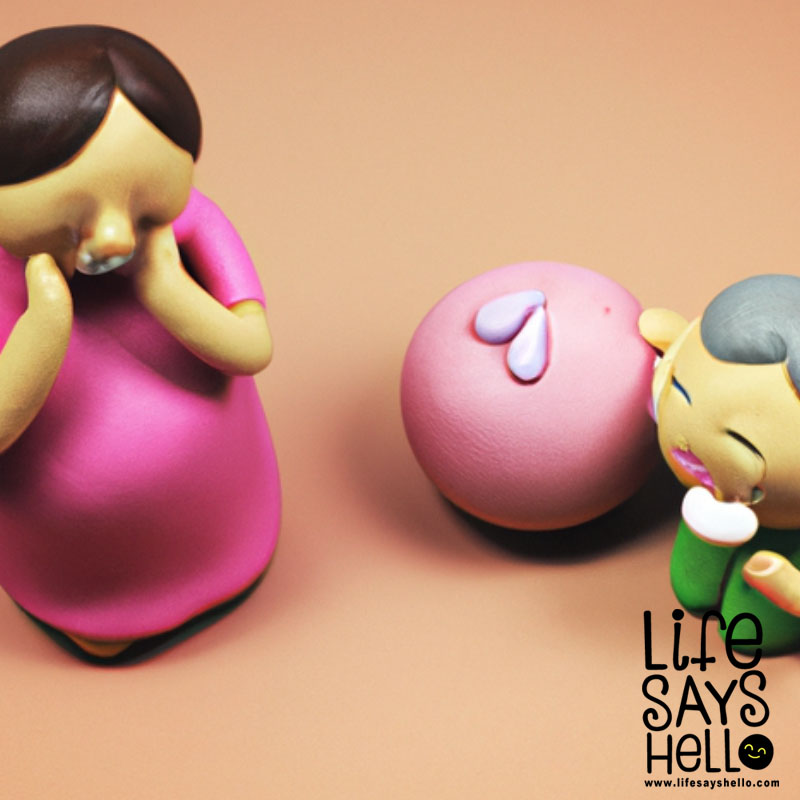Why Can't I Stop Burping? 9 Possible Reasons You're Belching So Much

Do you find yourself constantly burping and can't figure out why? You're not alone. Excessive belching can be an embarrassing and uncomfortable problem. The good news is that in most cases, frequent burping is treatable once you identify the underlying cause.
In this blog post, we'll explore the top 9 reasons why you might be burping excessively, from swallowing too much air to underlying health conditions that require medical attention. We'll also provide tips to help you reduce belching and discuss when you should see a doctor. Read on to finally get to the bottom of your recurring burps!
What Is Burping and Why Does It Happen?
Before we dive into reasons for frequent belching, let’s quickly cover what burping is and why we do it.
Burping, also known as belching or eructation, is the act of expelling gas from your stomach out through your mouth. It’s a normal bodily function that helps your body release excess air that has accumulated in your digestive tract.
Some reasons we tend to swallow air and build up gas include:
- Eating or drinking too quickly
- Talking while chewing
- Drinking carbonated beverages
- Chewing gum
- Smoking
- Wearing loose dentures
As the muscles of your esophagus relax, this trapped air is able to travel up and out as a burp. Burping helps relieve bloating, pressure, and abdominal discomfort.
Letting out a few occasional burps is perfectly normal and healthy. The average person burps around 3 to 6 times after eating a meal. However, if you're constantly belching throughout the day, it could point to an underlying issue.
Reason #1 - You're Swallowing Too Much Air
By far the most common reason for frequent burping is swallowing excessive amounts of air. Here are some habits that can cause you to gulp down more air than normal:
Eating or drinking too fast - When you eat or drink quickly, you end up taking in a lot of air along with your food and liquids. Slow it down and take smaller bites and sips. Be sure to chew thoroughly before swallowing.
Talking while eating - Engaging in conversation during meals means you're less likely to notice when you swallow air. Avoid talking with food in your mouth.
Drinking carbonated beverages - Fizzy drinks like soda contain carbon dioxide, which forms gas bubbles that you swallow. Consider cutting back on soda and sparkling water.
Chewing gum - Chewing gum causes you swallow air, which then gets trapped in your GI tract. Try cutting out gum altogether or limiting yourself to 1-2 pieces per day.
Smoking - When you inhale on cigarettes, vapes, etc the air gets pulled into your esophagus. Smoking causes chronic belching in many people.
Using a straw - Sipping drinks through a straw makes it easy to down more air. Drink straight from the cup or glass instead.
Loose dentures - Ill-fitting dentures allow extra air to be sucked into your mouth when eating and drinking. See your dentist to get them adjusted.
Reason #2 - You Have GERD
Gastroesophageal reflux disease (GERD) is a common digestive disorder that can also cause frequent belching. It occurs when stomach acid frequently flows back up into your esophagus, causing irritation. This is known as acid reflux.
The esophagus is the tube that connects your mouth and stomach. Normally it has muscles that tighten to stop acid from coming up. With GERD, these muscles are weakened or relaxed, allowing stomach acid to reflux upwards.
Acid reflux creates a burning sensation in your chest or throat known as heartburn. Belching is your body's way of releasing the excess air and gas caused by the reflux.
Other symptoms of GERD include:
- Bitter or sour taste in your mouth
- Excessive saliva
- Trouble swallowing
- Feeling like there's a lump in your throat
- Chronic cough or sore throat
- Tooth erosion
See your doctor if you experience persistent heartburn and belching. Treatment options for GERD include medications, diet changes, and surgery in severe cases.
Reason #3 - You Have a Food Intolerance
Food intolerances occur when your body struggles to properly digest certain foods. The most common intolerances associated with excessive burping include:
Lactose intolerance - This is when your small intestine lacks enough of the enzyme lactase to break down the milk sugar lactose. Dairy products can cause bloating, gas, cramping, and belching.
Gluten intolerance - Those with celiac disease or non-celiac gluten sensitivity have trouble digesting the protein gluten. It’s found in wheat, barley and rye.
Fructose malabsorption - Some people don’t absorb fructose (fruit sugar) efficiently. This leads to gas and belching after eating fruits, honey, etc.
Sorbitol intolerance - Sorbitol is a sugar alcohol used as a sweetener in sugar-free gum, mints, etc. It can ferment in the gut and cause gas.
Keep a food diary to identify problem foods that make your burping worse. Limiting your intake of foods you can’t properly digest can help reduce belching.
Reason #4 - You Have a Stomach Ulcer
A stomach ulcer (or peptic ulcer) refers to a sore that develops in the lining of your stomach, esophagus or small intestines. Ulcers form when the mucus layer protecting your stomach from acid wears away, allowing the digestive juices to damage and inflame the tissues.
The main cause of ulcers is an infection from the bacteria H. pylori. Other causes include long-term use of NSAID painkillers like aspirin and excessive alcohol consumption.
Ulcers can interfere with the muscles that help food pass through your digestive tract. This allows acid to back up, causing increased burping and reflux.
Other common symptoms of stomach ulcers are:
- Burning abdominal pain that feels worse when your stomach is empty
- Nausea
- Bloating
- Unexplained weight loss
- Vomiting or vomiting blood
Ulcers are diagnosed through a combination of medical history, physical exam, endoscopy, and testing for H. pylori bacteria. They can be treated with antibiotics, acid-blocking medications, and proton pump inhibitors. Lifestyle changes like avoiding smoking, alcohol, coffee, and NSAIDs are also recommended.
Getting an ulcer treated can help resolve burping caused by the backup of stomach acid. See your doctor if you have any ulcer symptoms along with frequent belching.
Reason #5 - You Have a Hiatal Hernia
A hiatal hernia refers to the upper part of your stomach bulging up through the diaphragm and into your chest cavity. The diaphragm is the sheet of muscle that separates your chest from your abdomen.
Normally, the esophagus passes through an opening in the diaphragm called the hiatus. With a hiatal hernia, this opening becomes weakened or enlarged, allowing the stomach to slide up through it.
This anatomical abnormality can interfere with the lower esophageal sphincter muscle that closes to prevent food and acid from coming up from the stomach. As a result, acid reflux occurs more easily. The constant backflow of acid causes repeated burping as your body tries to expel the excess gas.
Other hiatal hernia symptoms include:
- Heartburn
- Regurgitation of food or liquids
- Difficulty swallowing
- Chest pain
Hiatal hernias are often caused by obesity, pregnancy, straining from constipation, violent coughing, and heavy lifting. Treatment may involve acid reflux medication, diet changes, and surgery for larger hernias.
Reason #6 - You Have Aerophagia
Aerophagia is a condition where a person swallows an excessive amount of air, which gets trapped in the stomach and intestines. It leads to repeated belching, as well as bloating, abdominal pain and flatulence.
Some sources of aerophagia include:
- Constantly swallowing saliva
- Habitual gulping behaviors
- Chewing gum
- Drinking carbonated beverages
- Eating too quickly
- Smoking
- Hyperventilating
- Anxious behaviors like gasping, sighing, etc
Aerophagia can also be related to gastrointestinal issues that cause impaired belching, like esophageal motility disorders or gastroparesis.
This condition is sometimes linked to psychiatric disorders such as anxiety, depression, obsessive compulsive disorder (OCD), and autism spectrum disorders. Cognitive behavioral therapy can help manage compulsive swallowing of air.
Reason #7 - You're Anxious or Stressed
Anxiety, stress, and other mental health issues can also play a role in chronic belching. When you feel nervous or overwhelmed, you're more likely to swallow excess air and exhibit other behaviors that introduce gas into your GI tract:
- Taking deep breaths
- Gulping frequently
- Chewing gum to relieve tension
- Drinking carbonated drinks for comfort
- Eating too fast due to feeling rushed
Gut issues like gas, bloating, and burping are common physical symptoms that accompany anxiety. This is because a complex communication system exists between your brain and digestive system, known as the gut-brain axis.
High stress levels stimulate the vagus nerve, which can slow down digestion and trigger stomach acid production. Practicing stress management techniques like meditation, yoga, deep breathing, and positive thinking can help calm your mind and body.
Reason #8 - You Need to Stop Smoking
Smoking is another very common cause of excessive belching. It makes you swallow more air in these ways:
- Inhaling causes air to enter the esophagus
- The nicotine can relax the esophageal sphincter
- Smoking stimulates the production of stomach acid
When you light up a cigarette, the amount of saliva you swallow also increases. All this additional air gets trapped in the stomach and eventually released through repeated burping.
Kicking the smoking habit can significantly reduce belching for many people. If you need help quitting, talk to your doctor about nicotine patches, gum, counseling, prescription medications, or other smoking cessation aids.
Reason #9 - You Have an Underlying Health Condition
In some cases, frequent burping can result from a more serious underlying health condition. Examples include:
Gastroparesis - This disorder affects the normal spontaneous movement of the muscles in your stomach, preventing it from emptying properly. Food sits stagnant in the stomach and ferments, causing bloating and gas. Other symptoms are nausea, vomiting, and abdominal pain.
Dyspepsia - Also known as indigestion, dyspepsia refers to chronic upper abdominal pain and discomfort including belching, bloating, nausea, and heartburn. It’s often related to ulcers, GERD or gastritis.
Gastritis - This is when the lining of the stomach becomes inflamed and irritated. Chronic gastritis is often caused by H. pylori bacteria or excessive alcohol use.
Gastrointestinal cancers - Stomach, esophageal, or pancreatic cancer can all potentially cause increased burping when they grow large enough to obstruct normal digestion.
Chronic pancreatitis - If your pancreas becomes chronically inflamed, it produces less of the enzymes needed for proper digestion. This can result in excessive gas.
Gallbladder issues - Problems like gallstones or cholecystitis cause the gallbladder to improperly store and release bile, impairing fat digestion. This can lead to belching, gas, and bloating.
Celiac disease - This autoimmune disorder causes damage to the small intestine when gluten is consumed. Nutrient malabsorption occurs, resulting in excessive gas.
GI motility disorders - Conditions like achalasia, diffuse esophageal spasm, and scleroderma affect the muscular contractions required for normal swallowing and digestion. This allows air to build up and cause belching.
Diabetes - Uncontrolled blood sugar levels from diabetes can damage nerves that control digestive functions, leading to impaired motility, gas, and bloating.
If you have chronic belching along with related symptoms like pain, vomiting, or weight loss, see your doctor to identify or rule out any underlying medical conditions. Appropriate treatment can help manage problematic burping.
Tips to Reduce Belching
If you experience frequent burping, here are some tips to help minimize it:
- Eat and drink slowly - This reduces air swallowing.
- Avoid carbonated drinks - Try eliminating soda, beer, and sparkling water.
- Don't use straws - They make it easy to gulp air.
- Limit dairy if you have lactose intolerance.
- Take gas-reducing medications - Over-the-counter products like Gas-X, Beano or charcoal tablets can help.
- Manage heartburn - Treat GERD with diet, drugs, or surgery if needed.
- Quit smoking - This curbs air swallowing and acid reflux.
- Explore underlying causes - See your doctor to diagnose and treat any contributing health conditions.
When to See a Doctor About Frequent Burping
Occasional brief burping after meals is perfectly normal and nothing to worry about. But if you're plagued by chronic, excessive belching, it's a good idea to consult your physician, especially when accompanied by these symptoms:
- Heartburn
- Unexplained weight loss
- Fever
- Bloody or black stools
- Severe pain
- Difficulty swallowing
- Vomiting
These red flags can indicate a more serious underlying health issue requiring medical treatment, such as peptic ulcers, GERD complications, gallbladder disease, or even gastrointestinal cancer in rare cases.
Your doctor will evaluate your symptoms and medical history and may order tests like:
- Blood work
- Upper endoscopy
- Ultrasound
- Barium swallow
- Gastric emptying scan
- Esophageal manometry
Appropriate treatment can help give you relief from constant burping when it's disrupting your quality of life. With the right diagnosis and care, you can get to the bottom of excessive belching.
The Bottom Line
Frequent burping can be caused by many harmless habits like eating too fast or drinking soda. But it can also indicate more serious underlying health conditions.
Pay attention to any burping that seems excessive or chronic. Talk to your doctor if it occurs along with other disturbing symptoms or persists despite lifestyle changes. Getting the right diagnosis is key to stopping burps in their tracks and improving your quality of life.
With the right treatment plan for your specific cause, you can finally say goodbye to nonstop belching. The relief will be well worth it!




Comments